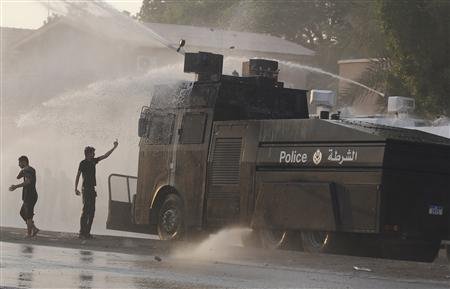MANAMA
(Reuters) - Bahraini protesters threw petrol bombs and stones on Tuesday at riot police who were trying to disperse them with
water cannons after the funeral of a Shi'ite man jailed for his role in last
year's pro-democracy uprising, witnesses said.
Bahrain's
Information Authority said Mohammed Ali Ahmed Mushaima had been in hospital since August, and
died of complications from sickle cell disease.
But opposition
activists accused the
authorities of causing the 23-year-old's death by denying him proper treatment.
"Due to
his medical condition, his lawyer had tried more than once ... to ensure
adequate medical attention for him, but the prison authorities failed to
provide such attention," said Mohammed al-Maskati, head of the Bahrain Youth
Society for Human Rights.
Mushaima was
jailed for seven years in March 2011 for "vandalism, rioting, assaulting a police officer and resisting arrest", one of
hundreds of people who were arrested in weeks of mass protests inspired by
uprisings in Tunisia and Egypt.
Despite that
crackdown and two months of martial law that followed, clashes between police
andprotesters still
occur almost daily in Bahrain, where the U.S. Fifth Fleet is based. On Friday,
a 17-year-old died in a confrontation with riot police.
The
protesters, mainly from the Shi'ite majority, had demanded a bigger role for
elected representatives and less power for the ruling al-Khalifa family, who
are Sunni Muslims. Some Shi'ite groups sought an end to the monarchy.
Shi'ites
complain of discrimination in the electoral system, jobs, housing, education
and government departments including the police and army. They say government
assertions that it is addressing those concerns have produced no action.
A commission
of international legal experts reported in November that torture had been
systematically used on protesters to punish and extract hundreds of
confessions. Among its many recommendations were reviewing activists' jail
sentences.
FUNERAL
Witnesses
said thousands of people, mostly Shi'ites, had gathered for Mushaima's funeral
on Tuesday, which passed peacefully.
They said
clashes erupted afterwards when police stopped hundreds of people trying to
march to the Pearl Roundabout, the center of last year's uprising.
Separately,
activists said six Bahraini medics had been re-arrested on Tuesday, a day after
losing appeals against jail terms ranging from one month to five years for
their role in the pro-democracy protests.
The medics
were freed from detention last year after an outcry over allegations of
torture.
Ali al-Ekry,
former senior surgeon at the Salmaniya hospital in Manama, was sentenced in
June to five years in jail. Eight other medics received prison sentences
ranging from one month to three years, and nine people were acquitted.
The charges
included inciting hatred and calling for the overthrow of Bahrain's rulers.
The World
Medical Association, a confederation of 100 national medical associations, said
the verdicts were "unacceptable" and urged Bahrain to drop the
sentences.
Amnesty said
it considered the jailed medics prisoners of conscience.
"Despite
the government's claims that the medics committed a criminal offence, Amnesty
International believes
they have been jailed solely for peacefully exercising their legitimate rights
to freedom of expression, association and assembly," said Ann Harrison,
program director for the Middle East and North Africa at Amnesty International.
Bahraini
officials could not be reached immediately for comment on the cases.
The
government has denounced the protest movement as sectarian and part of a quest
by Shi'ite Iran to dominate the region. Iran denies involvement and Bahraini Shi'ites
deny being steered from Tehran.
(Writing by
Raissa Kasolowsky; Additional reporting by Sami Aboudi; Editing by Kevin
Liffey)



















0 comments:
Post a Comment